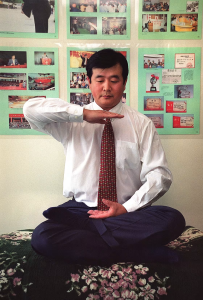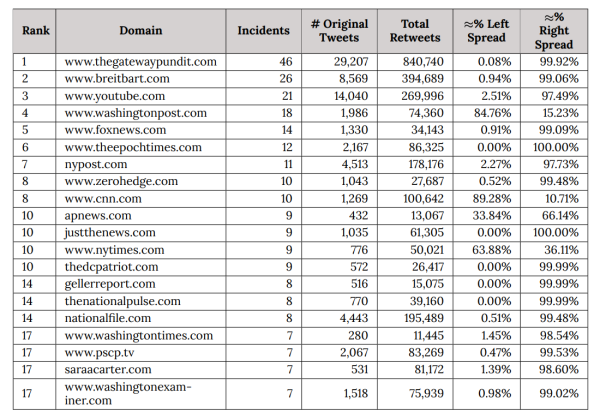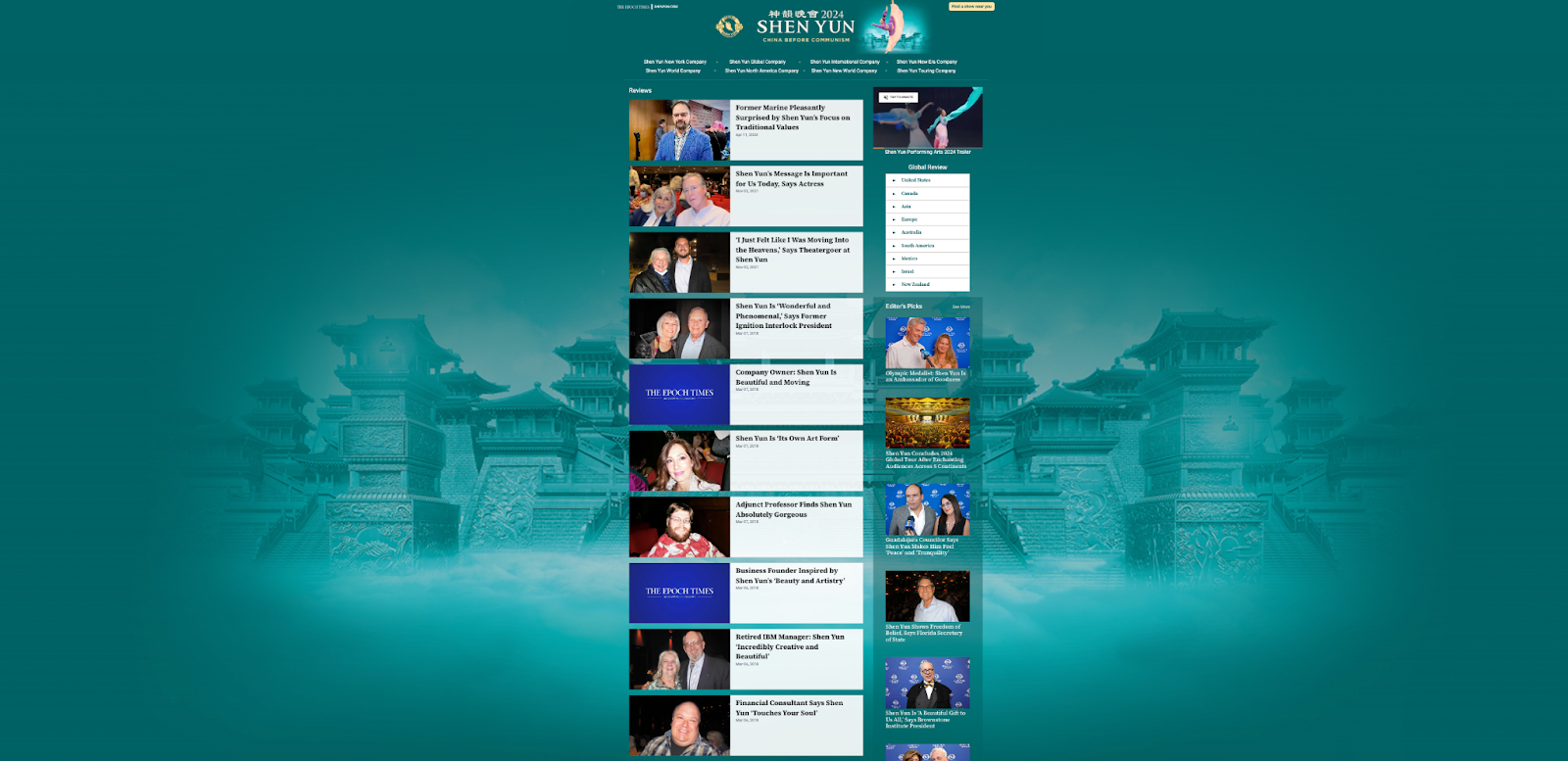
A few months back, in April, I was taking my bi-annual drive to the dentist office. As I made the turn from 2nd Street onto Griegos, I was confronted by a bright, abrasive billboard featuring a large, suspiciously AI generated-looking man. The Billboard boasted the title “#1 Trusted News.” How could the most trusted news source be one I had never even heard of before? Over the next few weeks it seemed like more and more of the billboards were turning up. Even the empty dirt lot near my house had been posted with a sign advertising The Epoch Times. A quick Google search told me that it wasn’t just Albuquerque: these same billboards had been showing up in major cities across the U.S. since 2016. So what on Earth was The Epoch Times?
The Epoch Times was founded in 2000 by John Tang and other Chinese Americans affiliated with the Falun Gong new religious movement. The founders said they were responding to censorship inside China and a lack of international understanding of the Chinese government’s repression of Falun Gong.

Falun Gong or Falun Dafa was founded in 1992 by Li Hongzhi, who’s considered a living messiah by his followers. Traditional Chinese cultural thought and opposition to modernity are the basis of Li Hongzhi’s teachings. According to the Zhuan Falun, Falun Gong’s foundational text published by Li, Falun Gong aspires to enable the practitioner to ascend spiritually through moral rectitude and the practice of a set of exercises and meditation. Li Hongzhi says the nature of the cosmos is the only standard for determining who’s good and who’s bad. The Falun Gong teachings echo traditional Chinese beliefs that humans are connected to the universe through mind and body as well as traditional Chinese medicine, including the claim to have the power to heal incurable illnesses.
Falun Gong provides a strict moral code for followers. They are expected to do good deeds and act with patience and forgiveness when encountering difficulties. Li stipulates that practitioners must “not hit back when attacked, not talk back when insulted” and “abandon negative thoughts and behaviors.” This includes lust, jealousy, greed, fighting, smoking, and alcohol.
Falun Gong’s teaching includes the practice of movements based on Qigong. Qigong is an ancient Chinese practice of movement that branched off the martial art Tai Chi. The word translates to gathering one’s energy and life force. There are five main movements to be performed daily. Together these movements are intended to open meridians encouraging the flow of energy through the body, increase wisdom and strength, expel bad energy, and strengthen divine and supernatural powers.

There is some disconnect between how Falun Gong is explained to outsiders and what its actual teachings are. Explanations of Falun Gong are often very vague. The three stated tenets of Falun Gong; truthfulness, compassion, and forbearance are repeated by Falun Gong members to outsiders as a tactic for evading deeper inquiry. Li forbids practitioners from talking about what he calls “high level things” to ordinary people, and instructs them to lie to those uninterested in spiritual matters.
At face value Falun Gong seems to be a pretty moderate spiritual practice, but much of its controversies stem from its leader, Li Hongzhi, who is known to have some very questionable teachings. According to his followers Li is “a God-like figure who can levitate, walk through walls and see into the future.” His ultra conservative teachings also include a rejection of modern science, art and medicine, and a denunciation of homosexuality, feminism, and evolution. Li has also repeated claims that aliens are responsible for scientific inventions. In a Times Magazine interview he attributed video games, as well as war and violence, to extraterrestrials. He stated that aliens were attempting to replace humans through a cloning process in which human bodies would be cloned with no soul, so that the aliens could replace the soul and inhabit human bodies.
Despite its controversial messiah, Falun Gong quickly grew in popularity in 1990s China. By 1999 Falun Gong claimed to have 100 million members. As it grew, Chinese Communist Party (CCP) officials became concerned with its state-independent leadership. This resulted in periodic acts of police harassment against Falun Gong followers in the late 1990s. In response to criticism and harassment, Li’s disciples staged peaceful protests to advocate for recognition of the right to practice their faith without interference.
The protests culminated on the 25th of April, 1999 when 10,000 followers gathered outside the central government compound in Beijing. After these protests, the Chinese government concluded that Falun Gong was growing too popular, labeled the movement a cult and suppressed it. In July of the same year, the government of China implemented a ban on Falun Gong, categorizing it as an “illegal organization.” Mass arrests, widespread torture, and forcible harvesting of organs followed. In 2008, the U.S. government reported estimates that as much as half of China’s labor camp population was made up of Falun Gong practitioners.
In spite of this, Falun Gong flourished abroad among the Chinese diaspora, and its teachings took on an ardent anti-Communist message. Even so, global coverage of the Falun Gong humanitarian crisis remained severely under reported. Falun Gong heavily faults the New York Times for this media distortion and on their website, FalunInfo, where they have published many articles laying their claim against the New York Times’ reporting of what they consider to be false facts and narratives. This alleged misrepresentation and under coverage is what led John Tang and his associates to start The Epoch Times, which quickly took on a fervent anti-communist direction that strictly produced anti-CCP propaganda.
For 15 years The Epoch Times remained mostly outside of the spotlight and generated little mainstream interest. Its audience was mainly followers of Falun Gong and people sympathetic to the Falun Gong’s persecution. All of this changed with the 2016 U.S. presidential election, when a promising new opportunity arose for Falun Gong and The Epoch Times in the form of Donald Trump. Trump was running a protectionist campaign, with China in its crosshairs. Trump became the Falun Gong’s champion and its path to their fight against the CCP on a global stage. The Epoch Times ramped up its Facebook ad spending and attached themselves to the Trump campaign. Simon van Zuylen-Wood at the Atlantic wrote that at this point, the paper “lost its liberal good will” but acquired a new “cohort of conservative readers with a reflexive suspicion of China.”
The Epoch Times spent massive amounts of money supporting Trump. Outside of the Trump campaign itself, The Epoch Times was the largest buyer of pro-Trump ads. Recently, Elon Musk passed that record, committing forty-five million a month to Trump’s 2024 campaign. In 2019 Epoch Times was reported to have spent 11 million dollars on over 11,000 Facebook ads across 6 months in support of Trump before it was shut down by Facebook for violating political advertising transparency rules.

After its heavy Facebook spending was revealed, The Epoch Times shifted tactics, and spent millions on ads from “sock puppet” pages like Honest Paper and Patriots of America. Sock puppet pages are accounts made and controlled by an organization that give the appearance of being a different organization. These pages are used to support the original organization’s views and further manipulate public opinion. By the end of the summer of 2019, numerous accounts associated with the paper had been banned from advertising on Facebook. Another outlet called TheBL.com (BL standing for “Beauty of Life”) made hundreds of accounts, groups, and pages to promote pro-Trump, anti-CCP content. TheBL.com was created in 2016 by Trung Vu, then the CEO of the Vietnamese edition of The Epoch Times. Facebook reported that TheBL.com had spent close to $9.5 million on ads supporting itself and pro-Trump, anti-CCP content by the time it was banned in late 2019.
After Trump’s defeat in the 2020 election, The Epoch Times pivoted from providing Trump’s ads to providing Trump’s false news. According to the Election Integrity Partnership It published a range of misleading “voter fraud” narratives, including falsehoods that large numbers of people voted twice and discarded ballots were evidence of fraud. It also spread QAnon theories and other inflammatory conspiracies. With the Covid-19 outbreak, The Epoch Times revamped its anti-CCP propaganda and published articles accusing China of engineering the virus. Their most brazen publishing of misinformation has been their coverage of the Covid-19 vaccine, which has ranged from suggesting inaccurate side effects to discounting the vaccines’ functionality all together.
The Epoch Times’ right wing rhetoric has cemented its place as one of the conservatives’ media outlets of choice. A quick read through the comments on Epoch Times articles will tell you all you need to know about its demographics. And, unbeknownst to most, The Epoch Times has become a real juggernaut of media. Its revenue increased by 685% from 2019 to 2021 and they now reportedly make over $120 million annually. In 2020 it took the spot of the New York Times for Apple’s most popular newspaper app in the country. Today it claims to be the fourth largest newspaper by subscriber count. Although, unlike almost all other newspapers, The Epoch Times isn’t audited by the Audit Bureau of Circulations, meaning there’s no actual data to verify this. Because the Epoch Times is a non-profit, it is exempt from most federal taxes. It also means that its tax filings are publicly available. The Epoch Times makes most of its money from subscription revenue. In 2022 they reported almost $60 million gained from subscriptions. Across the U.S. The Epoch Times prints and distributes unsolicited special editions of its paper. In 2020, the company mailed 280,000 free copies of its newspaper in Philadelphia alone. This advertising tactic garnered further criticism when it was released that The Epoch Times bought lists of addresses from data brokers, specifically for conservatives aged 60 and over. Many of its new subscribers are seniors, according to an employee’s account at a Falun Gong conference.
The Epoch Times’ connection to Falun Gong means it has a constant stream of nearly unpaid volunteers because working for The Epoch Times is as much spiritual practice as it is a career choice. Although the Epoch times made $128 million in 2022, only $3 million went to salaries and wages. And that was about all of The Epoch Times’ expenditures. Everything else is put back into the company as advertisements and prints of its paper. The number of volunteers working for The Epoch Times increases its revenue, but decreases its credibility. Many of the people writing its articles have no journalistic experience or qualifications outside of their connection to Falun Gong. The Epoch Times is incredibly good at presenting and marketing itself as a credible source. If it looks legit, then it must be. And that’s where much of the success of the Epoch Times lies.

In Albuquerque, The Epoch Times had at least 6 billboards, 4 of them on major roads. With prices ranging from $2,000 to $4,000 per month depending on the road, The Epoch Times spent over $60,000 for the three months that they had billboards up in Albuquerque.
So why was this unheard-of media juggernaut buying billboards in Albuquerque? The most likely answer is Shen Yun. “Shen Yun, China before communism” is Falun Gong’s other business venture. Although Epoch Times representatives deny any affiliation with Falun Gong and Shen Yun, it is clear in tax filings that they are all financially and organizationally the same entity. In 2021 The Epoch Times provided Shen Yun with $10.4 million in grants. Shen Yun aims to educate those who watch the performance on the Buddhist and Toast culture that existed in China before communism. The exuberant two-hour long set also includes depictions of the Falun Gong persecution which has garnered it harsh criticism from the CCP. Shen Yun, just like The Epoch Times, comes with its own set of controversies and colorful billboards that occasionally take over cities. Shen Yun’s billboards commonly boast “Absolutely the No. 1 show in the world.” It seems The Epoch Times billboards that showed up in Albuquerque around March, 2024 aligned with Shen Yun, which was in Popejoy in mid-April. The Epoch Times provided coverage of Shen Yun in Albuquerque by publishing bizarre interviews with vaguely successful New Mexicans; the interviews are written in a strange, almost ethereal prose that makes them feel suspiciously fabricated. The whole thing seems strange but is very on brand for The Epoch Times, Shen Yun, and Fulan Gong.



 The Epoch billboards roughly follow the path of Shen Yun, but they have also been popping up in swing states in election years. As the 2024 election date is fast approaching, it’s always a good reminder to be aware of the content and media we consume. Media manipulation is very real and just because something looks official doesn’t necessarily mean it is. It’s always a good idea to spend some time looking below the surface of news sites and ad campaigns. In such a polarized time, it’s good to remember that companies and news agencies use that polarization to push their own profits and agendas. Companies literally spend millions of dollars a month just to get our attention and subscriptions. Our opinions hold power– wield that power wisely.
The Epoch billboards roughly follow the path of Shen Yun, but they have also been popping up in swing states in election years. As the 2024 election date is fast approaching, it’s always a good reminder to be aware of the content and media we consume. Media manipulation is very real and just because something looks official doesn’t necessarily mean it is. It’s always a good idea to spend some time looking below the surface of news sites and ad campaigns. In such a polarized time, it’s good to remember that companies and news agencies use that polarization to push their own profits and agendas. Companies literally spend millions of dollars a month just to get our attention and subscriptions. Our opinions hold power– wield that power wisely.








Miranda Kennedy • Apr 22, 2025 at 3:40 pm
I too have seen these janky billboards and wondered… how can they be trusted if I’ve never heard of them? A great article and thank you for doing all this research! I recommend the book “Careless People” to you as well… another great expose of Facebook’s role in 2016 and other elections.
Uzair Hammad ‘24 • Sep 25, 2024 at 6:04 pm
Brighton, well-researched and detailed piece. It is awesome for me to see your progression from the first (much shorter) article you ever wrote last school year to this much longer bit of investigative journalism.
Dean Jacoby • Sep 24, 2024 at 1:59 pm
I started see Epoch Times ads many years ago in my news feed. They made me vaguely uneasy, but I wasn’t sure where they came from. Thank you for indepth and carefully researched reporting that helps remind me to be mindful of what I read.
Tomas • Sep 24, 2024 at 9:08 am
Great article!
George Ovitt • Sep 24, 2024 at 7:10 am
A brilliant piece of reporting and writing. I had many questions myself when first seeing these billboards and YT ads. Thanks for doing the hard work for all of us.